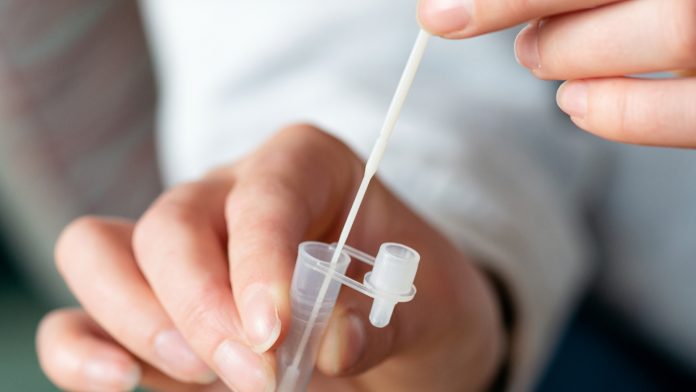
Researchers have developed a low-cost, portable COVID-19 rapid test that provides results in 23 minutes.
Two teams from Columbia Engineering and Rover diagnostics have joined forces to develop a COVID-19 rapid test using reverse transcription polymerase chain reaction (RT-PCR) technology. PCR plays a critical role in molecular diagnostic testing and genetic material detection; however, RT-PCR testing is available at laboratories but not in point-of-care settings due to expenses, time, and technicalities. Therefore, this presents a new opportunity to create a COVID-19 rapid test employing RT-PCR technology that performs a quick diagnosis at home and matches laboratory-based tests.
The researchers published their findings in Nature Nanotechnology.
Developing rapid diagnostic platforms
The researchers developed the COVID-19 rapid test platform that provides results in 23 minutes; however, the test can also be adapted to diagnose a broad range of infectious diseases, including flu, strep, and other viruses that require a rapid diagnosis. The targeted sensitivity in the RT-PCR test is notably higher than other tests such as isothermal, antigen, and CRISPR. Furthermore, the test is lightweight, weighing two pounds, making it easy to carry around.
“Our aim was to create a platform that can be used in locations where rapid turnaround results are critical, at pharmacies, transportation hubs, public events, and at companies screening employees coming back to work,” said Sam Sia, Professor of Biomedical Engineering and Vice Provost for the Fourth Purpose and Strategic Impact at Columbia.
COVID-19 rapid test: Providing laboratory quality results at home
The COVID-19 rapid test platform uses sample preparation techniques developed at a laboratory, combined with thermal cycling, which evades the standard approach of the Peltier device – which heats the sample from outside the vial. Alternatively, the system uses a photothermal process relying specifically on nanoparticles irradiated by light to generate heat from inside.
The team successfully performed reverse-transcriptase quantitative PCR (RT-qPCR) in a reaction vessel containing all the PCR reagents. qPCR is currently employed in the laboratory to identify COVID-19 infection, and this approach provided quantitation of infectious units but also poses several challenges.
These challenges faced, specifically in point-of-care settings, were addressed by the researchers. They leveraged plasmonic nanoparticles to achieve real-time and multiplexed RT-qPCR on clinical specimens.
“This should really move the needle on delivering rapid and accurate molecular clinical diagnostics in decentralised settings,” said Fasciano, a computer scientist turned software and biotech entrepreneur. “Thermal cycling, so critical to DNA and RNA testing, can now be sped up, and clinicians and patients alike won’t have to wait so long for results.”
The team plans to move forward with their commercial COVID-19 rapid test and other infectious diseases tests.
























